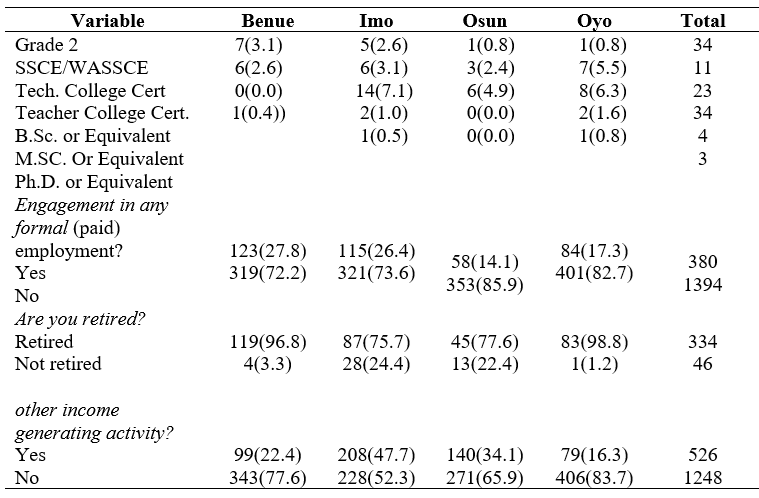Profiling Socio-Demographic Characteristics of Octogenarians in Nigeria for Effective Policy Formulation: An Educational Perspective
DOI:
https://doi.org/10.51574/ijrer.v4i1.2604Keywords:
Disability, Educational Perspective, Mobility Policy, Social Support, Well-BeingAbstract
The study examined the socio-demographic profile of the octogenarians in Nigeria from an educational perspective. We adopted a cross-sectional research survey design. All octogenarians in Nigeria constituted the study population. A multi-stage procedure selected a sample of 1,774 individuals. We adopted a snowball sampling approach to select participants until we reached the desired sample size. An adapted version of the World Health Organization's (WHOQOL) questionnaire programmed in the Open Data Kit (ODK) was used for data collection. We analyzed the collected data using frequency counts and simple percentages. The mean age of octogenarians was 83 years. Male-headed households were most common (66.2%) among octogenarians. Vision (8.6%) and mobility (12.1%) issues were the types of disability common to octogenarians in Nigeria. Fewer Nigerian octogenarians are still flourishing and making productive contributions to society, but a greater proportion of them need social and educational supports and physical health needs for better well-being.
References
Antczak, R., Quashie, N. T., Mair, C. A., & Arpino, B. (2023). Less Is (Often) More: Number of Children and Health Among Older Adults in 24 Countries. The Journals of Gerontology: Series B, (78)11, 1892–1902. https://doi.org/10.1093/geronb/gbad123
Akinyemi, A. I., & Akinlo, A. (2014). Unmet needs for care and support of the elderly in Nigeria: Gaps in experiences and expectations of the aged in Ilesa, Southwest Nigeria. Nigerian Journal of Sociology and Anthropology, 12(1), 28-43.
Alterovitz, S. S., & Mendelsohn, G. A. (2013). Relationship goals of middle-aged, young-old, and old-old Internet daters: an analysis of online personal ads. Journal of Aging Studies.27, 159–65.
Amaike, B. (2016). Sustainability, Livelihoods, and Quality of Life of Older Retirees in Lagos State, Nigeria. Journal of Global Initiatives: Policy, Pedagogy, Perspective, 10(2), 10.
Ayokunle, A. M., Oyeyemi, F. T., Onipede, W., O, T. F., Olagunju, A. E., Makinde, G. B., ... & Oluwatomipe, A. P. (2015). The definitions and onset of an old person in South-Western Nigeria. Educational Gerontology, 41(7), 494-503.
Baranowska-Rataj, A., & Abramowska-kmom, A. (2019). Number of children and social contact among older people: The moderating role of filial norms and social policies. European Journal of Aging, 16(1), 91-107.
Chia, J. L., & Hartanto, A. (2021). Older adult employment status and wellbeing: a longitudinal bi-directional analysis. International Journal on Environmental Research and Public Health, 18(23), 12533.
Cheng, J. M., Batten, G. P., Cornwell, T., & Yao, N. (2020). A qualitative study of health-care experiences and challenges faced by ageing homebound adults. Health expectations: an international journal of public participation in health care and health policy, 23(4), 934–942. https:// https://doi.org/10.1111/hex.13072
DeAngelis, T. (2023). Nearly half of the oldest Americans have disabilities: The COVID-19 pandemic was especially hard on adults who have disabilities, inflicting almost twice the rate of distress on them as on adults without disabilities. American Psychological Association, 54(8), 80.
Ede, S. S., Ugwuodo, E. P., Okoh, C. F., Egbumike, C. J., Deborah Adaeze Chukwu, D. A. Irem, F. O., & Nwatu, U. L. (2023). Impact of religious participation and spirituality on the health of Nigerian older people: An online survey. Journal of Religion, Spirituality & Aging, 35(1), 56-70.
Faronbi, J. O., Ajadi, A. O., & Gobbens, R. J. (2020). Associations of chronic illnesses and socio-demographic factors with health-related quality of life of older adults in Nigeria: A cross-sectional study. Ghana Medical Journal, 54(3), 164-172
Grinin, L., Grinin, A., & Korotayev, A. (2021). Global trends and forecasts of the 21st century. World Futures, 77(5), 335-370.
Khan, H. T. (2019). Population ageing in a globalized world: Risks and dilemmas?. Journal of evaluation in clinical practice, 25(5), 754-760.
Kpessa-Whyte, M. (2018). Aging and demographic Transition in Ghana: State of the elderly and emerging issues. The Gerontologist, 58(3), 403-408.
Lee, S. B., Oh, J. H., Park, J. H., Choi, S. P., & Wee, J. H. (2018). Differences in youngest-old, middle-old, and oldest-old patients who visit the emergency department. Clinical and Experimental Emergency Medicine, 5(4), 249-255.
Morgan, O. M., Etukumana, E. A., & Abasiubong, F. (2017). Sociodemographic Factors Affecting the Quality of Life of Elderly Persons Attending the General Outpatient Clinics of a Tertiary Hospital, South-South Nigeria. Nigerian Medical Journal: Journal of the Nigeria Medical Association, 58(4), 138-142.
Nawagi, F., Söderberg, M., Berggren, V., Midlöv, P., Ajambo, A., & Nakasujja, N. (2018). Sociodemographic characteristics and health profile of the elderly seeking health care in Kampala, Uganda. Current Gerontology and Geriatrics Research, 2018.
Ogunlusi, C. F., David, J. O., Atunbi, J. A. & Ajani, J. O. (2018) Employment generation and poverty alleviation: the effect of entrepreneurship development programmes in Southwest Nigeria. World Journal of Entrepreneurial Development Studies 2(3) 10-26.
Onwumechili, C., & Akpan, U. S. (2023). How Sport, Communication, and Economics Are Changing Power Dynamics in the African Family. In African Media Space and Globalization (pp. 373-390). Cham: Springer Nature Switzerland.
Orugun, J. J. & Nafiu, A. T. (2014) An exploratory study of Igbo entrepreneurial activity and business success in Nigeria as the panacea for economic growth and development. International Journal of Scientific & Technology Research. 3(9) 158-165.
Shaked, O., Korn, L., Shapiro, Y., Koren, G., & Zigdon, A. (2022). Socio-demographic characteristics and their relation to medical service consumption among the elderly in Israel during the COVID-19 lockdown in 2020 as compared to the corresponding period in 2019. PLoS ONE 17(12): e0278893.
Schuster, A. M., & Cotton, S. R. (2024). Differences between employed and retired older adults in information and communication technology use and attitudes. Work, Aging and Retirement, 10(1), 38–45,
United Nations, Department of Economic and Social Affairs, Population Division (2019). World Population Ageing 2019: Highlights (ST/ESA/SER.A/430).
Tanyi, P. L., André, P., & Mbah, P. (2018). Care of the elderly in Nigeria: Implications for policy. Cogent Social Sciences, 4(1), 1555201.
Tavares, D. M. S., Mapelli de Paiva, M., Dias, F. A., Diniz, M. A., & Martins, N. P. F. (2013). Socio-demographic characteristics and quality of life of elderly patients with systemic arterial hypertension who live in rural areas: the importance of nurses’ role. Rev. Latino-Am. Enfermagem, 21(2), 515-522.
United Nations Department of Economic and Social Affairs: Population Division. (2015). World population prospects.
The United Nation’s Population Fund (2023). World population dashboard. http://www. unfpa.org/dataworld-population-dashboard.
World Health Organisation (2024). Aging: Key facts. https://www.afro.who.int/healthtopics/ageing#:~:text=Estimated%20at%2043%20million%20in,mortality%20in%20the%20African%20Region.

Downloads
Published
How to Cite
Issue
Section
License
Copyright (c) 2025 ETDC: Indonesian Journal of Research and Educational Review

This work is licensed under a Creative Commons Attribution-ShareAlike 4.0 International License.













1.png)













